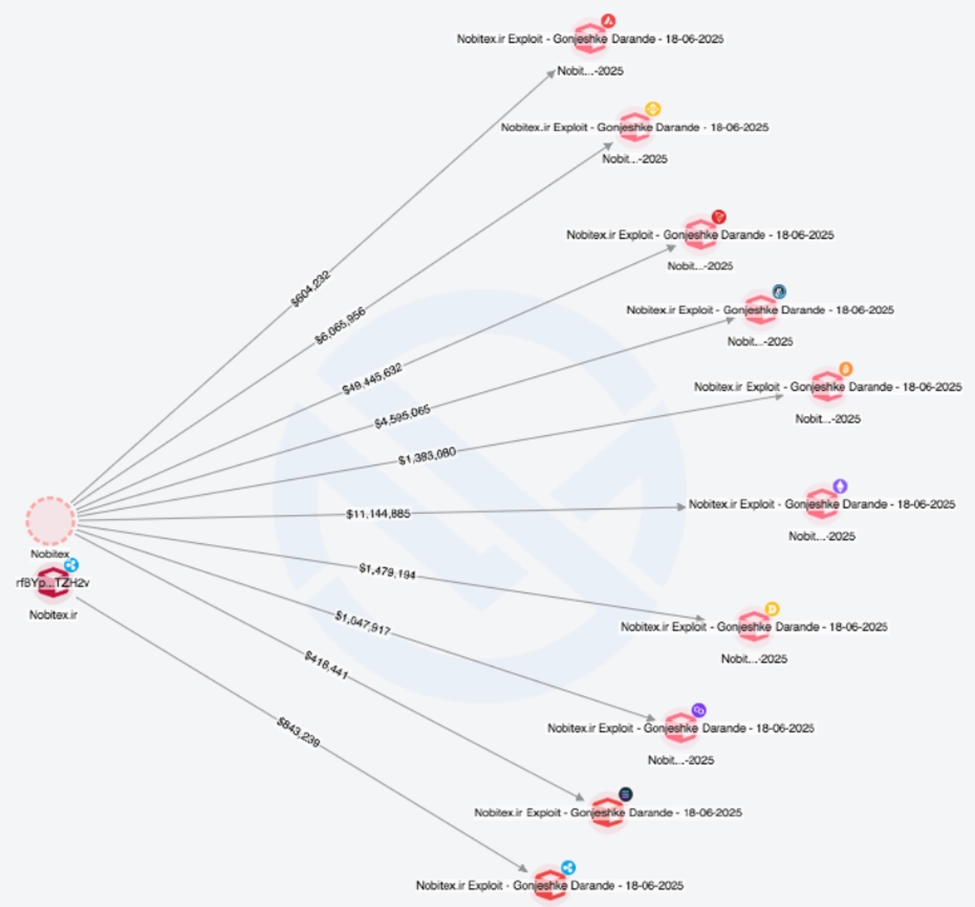As military tensions escalate between Israel and Iran, crypto and blockchain are being pulled into the conflict, not just financially, but digitally.
The recent $81 million hack of Iranian crypto exchange Nobitex marked a turning point, with experts warning that blockchain has officially become a geopolitical battleground.
Merkle Science acknowledged that Gonjeshke Darande carried out the exploit, which aligns with BeInCryptos recent report on the hacktivist group.
However, according to Merkle Science, a blockchain analytics and predictive risk platform, the attack was a message that blockchain is now a geopolitical front line.
This wasnt just theft. It was a message. Blockchain is now a geopolitical front line, the firm stated.
This remark came after their forensic tracker revealed how the stolen funds moved across multiple addresses. It points to this attack going beyond a typical cybercrime incident, to a politically motivated move.
 Visual of the hack distribution from Merkle Sciences Tracker. Source: Merkle Science on X.
Visual of the hack distribution from Merkle Sciences Tracker. Source: Merkle Science on X. Indeed, BeInCrypto reported Gonjeshke Darande groups motivation, clamping down on Iran as part of Israels perceived war against Iran-fueled terrorism.
The group is widely believed to be linked to Israeli military intelligence, though Israel maintains ambiguity about its involvement.
The Nobitex exchange is at the heart of the regimes efforts to finance terror worldwide, as well as being the regimes favorite sanctions violation tool&Nobitex doesnt even pretend to abide by sanctions. It publicly instructs users on how to use its infrastructure to bypass sanctions. The regimes dependence on Nobitex is evident from the fact that working at Nobitex is considered valid military service, as it is vital to its efforts, the hacker group said on Wednesday.
The attack on Nobitex shows a trend of weaponizing crypto infrastructure in state-level and asymmetric conflicts.
This shift has major implications. Investors now face a playing field where their assets are subject to market volatility and increasingly vulnerable to targeted geopolitical strikes.
If the countries hosting major crypto exchanges become involved in conflict, the platforms may become high-profile targets.
Failure to lead in blockchain and cryptocurrency exposes nations to economic disruption, regulatory gaps, and security vulnerabilities, risks those adversarial states are ready to exploit, Merkle Science warned in a report.
The report also notes that blockchains decentralization is not absolute. This means nation-states can exploit their infrastructure through traffic filtering or validator capture, turning a strategic asset into a liability.
Indeed, the strategic role of blockchain is already evident in US defense initiatives. The Navys use of SIMBA Chain to track F/A-18 aircraft parts proves the technologys real-world utility in securing critical systems.
At the same time, its anonymity and speed have made crypto a powerful tool for illicit actors. From laundering to sanctions evasion, cryptocurrencies have long been favored by rogue states and terrorist groups.
In 2024 alone, crypto-related hacks and exploits resulted in $1.49 billion in losses, more than double the previous year. Groups like North Koreas Lazarus have financed operations by exploiting vulnerabilities in crypto platforms, including the $1.5 billion Bybit heist.
The Nobitex hack adds another layer of urgency, highlighting the role of digital assets in modern warfare. As sanctions tighten and conventional finance becomes harder to access, state-aligned hackers and insurgent groups increasingly turn to crypto to send a message.
For Gonjeshke Darande, it is to retaliate against Irans regional aggression and its proxies, such as Hezbollah and the Houthis, while minimizing civilian harm
Disclaimer
In adherence to the Trust Project guidelines, BeInCrypto is committed to unbiased, transparent reporting. This news article aims to provide accurate, timely information. However, readers are advised to verify facts independently and consult with a professional before making any decisions based on this content. Please note that our Terms and Conditions, Privacy Policy, and Disclaimers have been updated.



